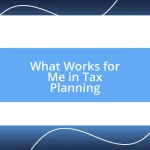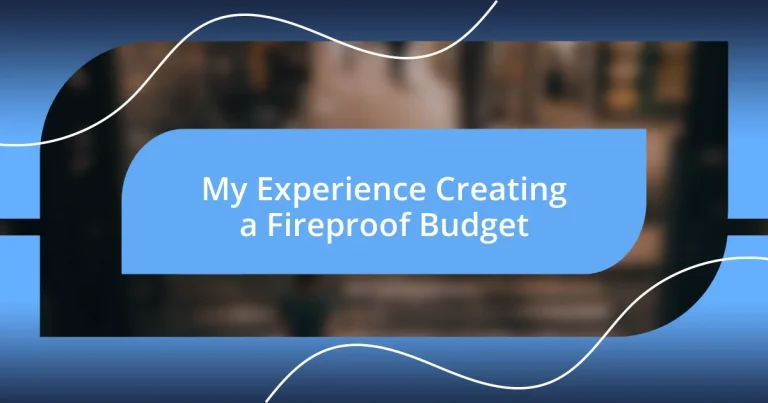Key takeaways:
- A fireproof budget is essential for managing unexpected expenses and providing financial peace of mind.
- Identifying essential expenses helps prioritize spending and align financial goals with personal values.
- Regularly reviewing and adjusting the budget fosters flexibility, celebrates milestones, and enhances financial resilience.
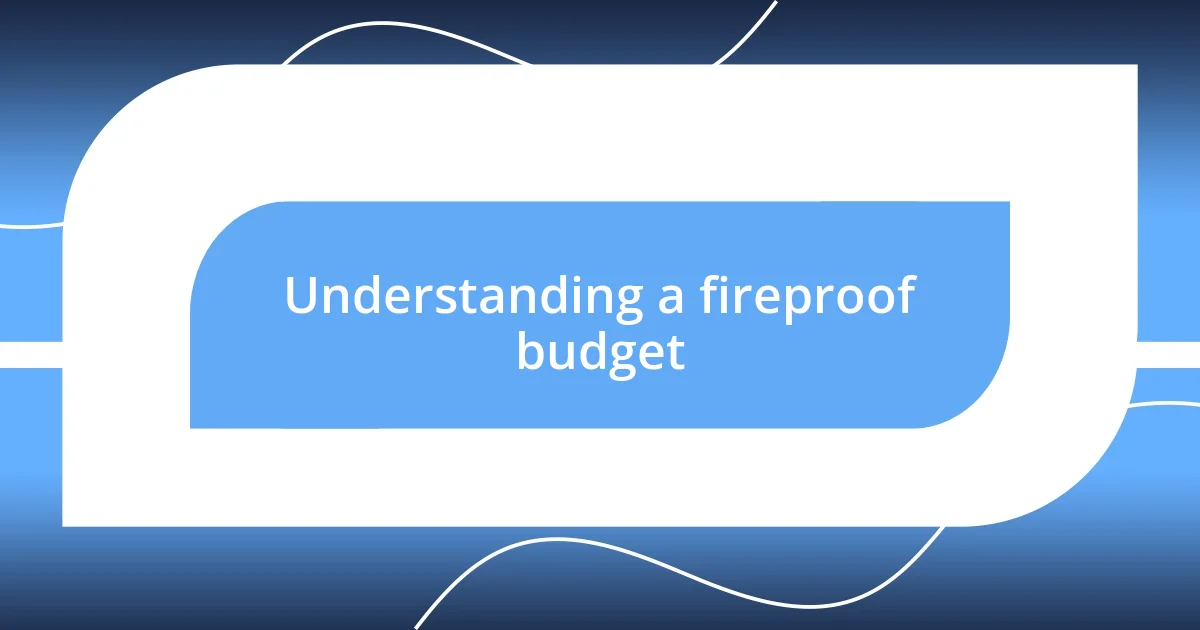
Understanding a fireproof budget
Understanding a fireproof budget involves recognizing that it’s not just about numbers—it’s about peace of mind. When I first set up my budget, I was overwhelmed, thinking it was merely a chore. But I realized it was a meaningful map guiding my financial journey, protecting me from unexpected expenses.
Have you ever faced an unplanned bill that made your heart race? I sure have, and it was a wake-up call. Developing a fireproof budget means anticipating those moments by allocating funds for emergencies. It’s about creating a cushion, so you can embrace life’s surprises without stress.
Ultimately, a fireproof budget gives you control over your finances. When I see that extra savings grow, I feel empowered. It’s not just about saving money; it’s about building a future where I don’t constantly worry about financial what-ifs. Doesn’t that sound liberating?
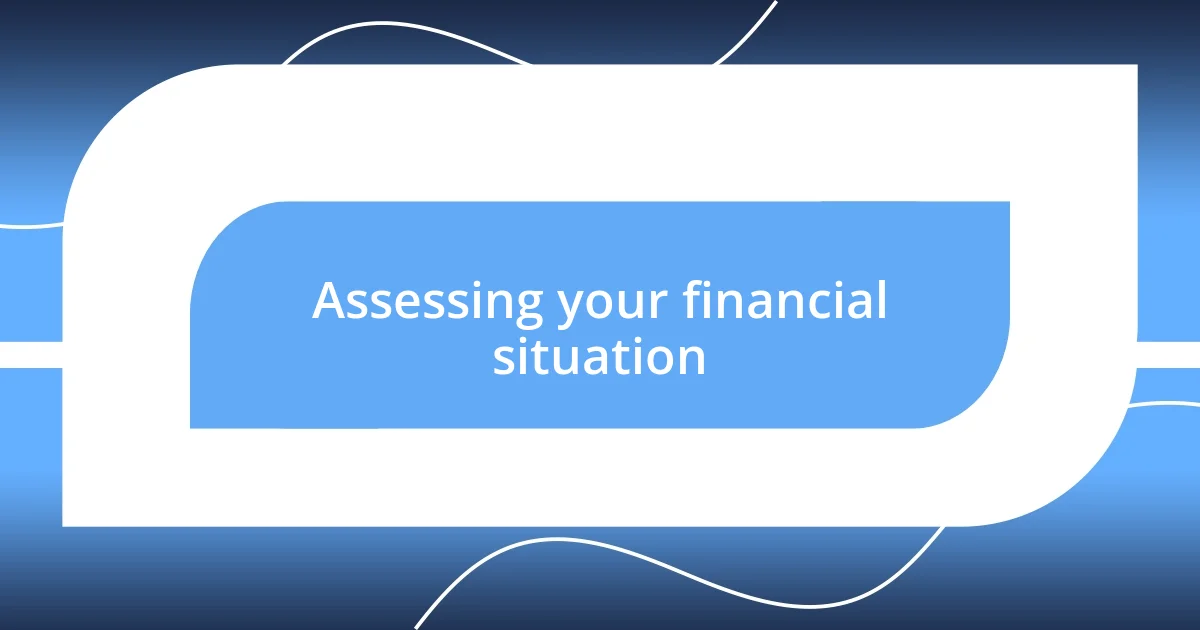
Assessing your financial situation
When I set out to assess my financial situation, I found it essential to get a clear picture of where I stood. I gathered all my financial statements, listing my income, expenses, debts, and savings. Having everything in one place made the process much more manageable and less intimidating than I had imagined.
- Total monthly income
- Fixed expenses (like rent, utilities, subscriptions)
- Variable expenses (like groceries, entertainment)
- Total debt (credit cards, loans)
- Savings (emergency fund, retirement)
I remember the first time I laid everything out—it felt like a confession. Seeing my finances on paper was both daunting and enlightening. It helped me identify areas where I was overspending and showed me the urgent need for a solid plan, urging me to make changes that ultimately empowered me.
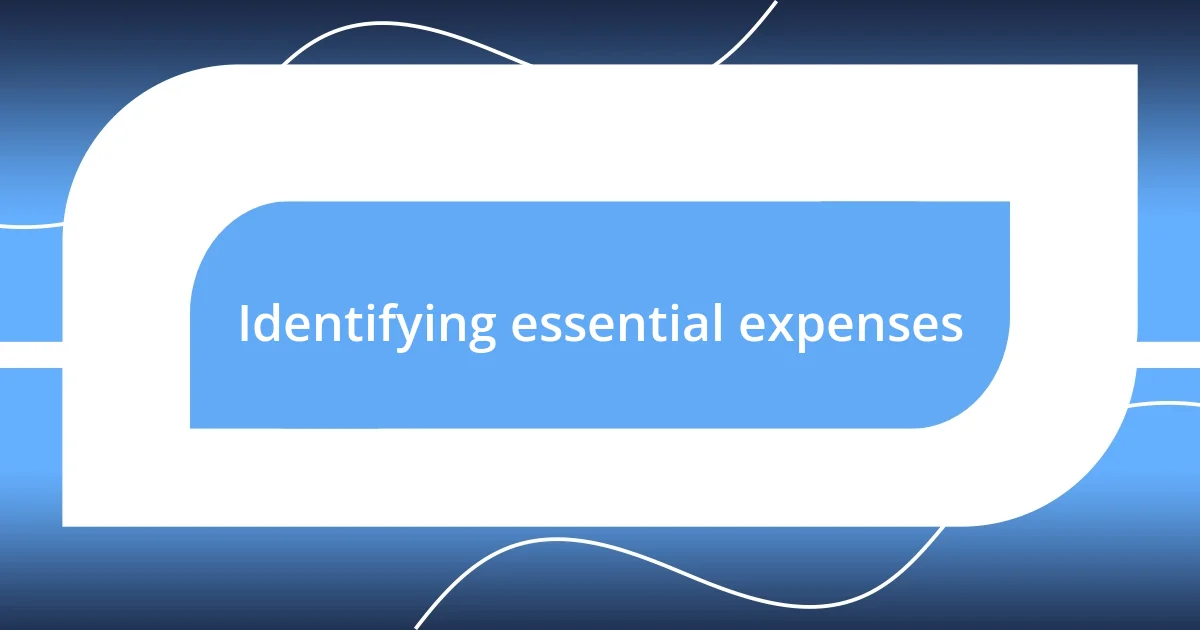
Identifying essential expenses
Determining essential expenses is a vital step in crafting a fireproof budget. When I first tackled this task, I found it incredibly eye-opening to distinguish between needs and wants. It can be so tempting to consider that daily coffee run an “essential,” but it really isn’t. I learned to prioritize critical expenses like housing, groceries, and transportation first. These are the foundation of my budget, and understanding what truly matters gave me clarity about my spending habits.
As I began allocating funds, I created a simple table to visualize these essential expenses. This way, I could see exactly where my money was going each month. Having everything laid out helped me assess if I was spending wisely or if I could trim the fat in other areas. For example, I realized that my grocery bills were higher than necessary, leading me to plan meals better and avoid impulse buys.
| Essential Expenses | Examples |
|---|---|
| Housing | Rent or mortgage payments |
| Utilities | Electricity, gas, water |
| Transportation | Car payments, public transit |
| Groceries | Food purchases |
| Insurance | Health, auto, home insurance |
| Debt Payments | Credit cards, loans |
Reflecting on my journey, I find that identifying essential expenses is more than just counting dollars; it’s about aligning my financial goals with my values. It was a process filled with trial and error, and sometimes it felt overwhelming. However, each decision I made strengthened my financial resilience, allowing me to feel more in control and hopeful about my future. Have you recognized your own essential expenses yet? That awareness can transform your budgeting experience.
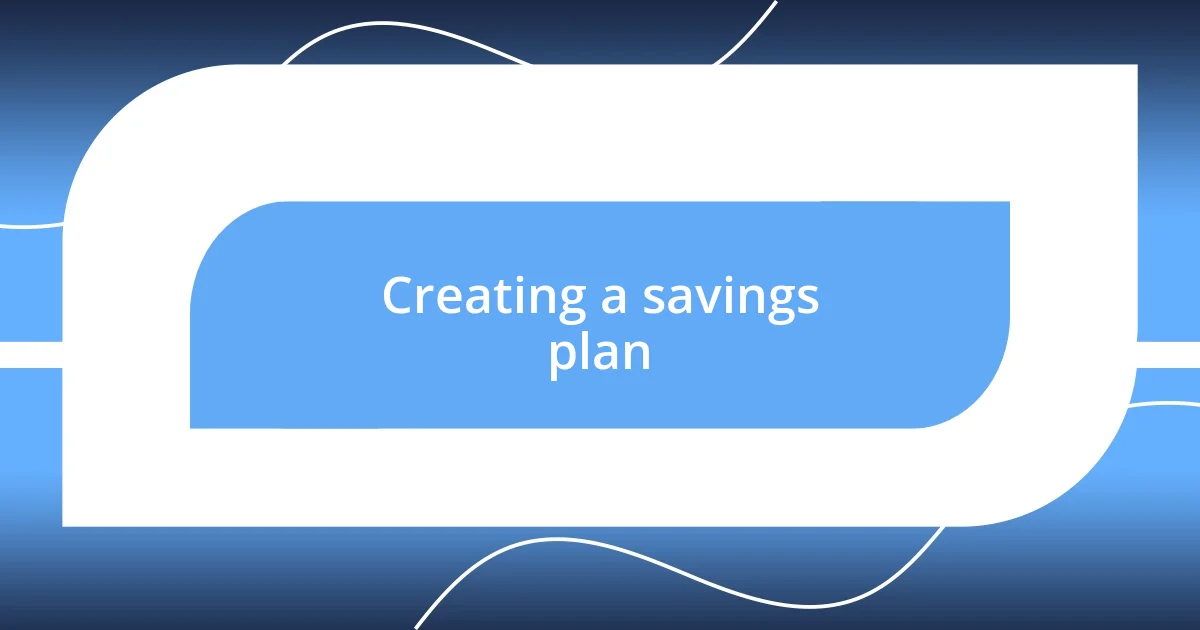
Creating a savings plan
Creating a savings plan requires deliberate effort and understanding of what you want to achieve. For me, setting specific savings goals was the first step. I remember sitting down with a notebook and jotting down what I was saving for—an emergency fund, a vacation, and even future investments. This helped transform my savings from a vague idea into tangible targets that I could visualize. Have you ever thought about what you’d like to save for? It can really change how you view your savings.
Next, I realized the importance of automating my savings. I set up transfers from my checking account to my savings account right after each payday. Initially, it felt a bit strange to reduce my spending money so quickly, but the peace of mind I gained knowing I was building my savings without even thinking about it was worth it. I’d challenge anyone to try automating their savings. It’s a small change that can lead to big results over time.
Lastly, I found that regularly reviewing my savings plan was crucial. Each month, I would check my progress and adjust my goals as necessary. Whether it was celebrating reaching a small milestone or tweaking my approach due to unexpected expenses, this reflection kept me motivated. It’s fascinating how acknowledging progress, no matter how small, fuels your drive to continue. How often do you revisit your savings plans? Trust me, it makes all the difference in staying on track!
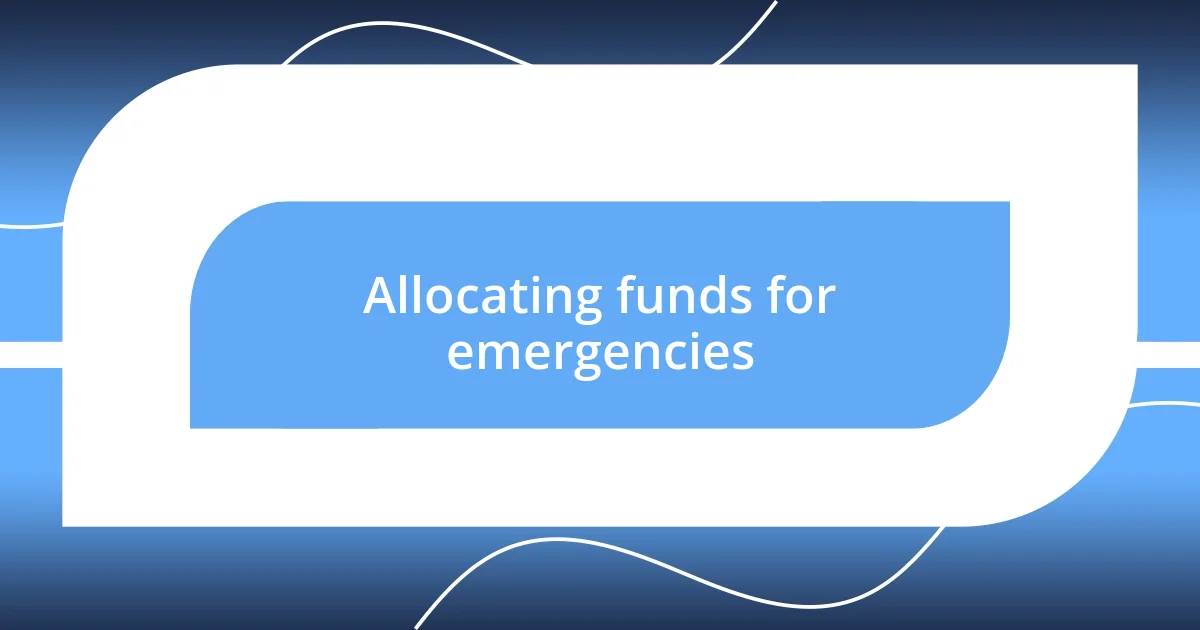
Allocating funds for emergencies
When it comes to allocating funds for emergencies, I’ve learned that a solid plan can save you from sleepless nights. In my early budgeting days, I remember facing an unexpected car repair. I had to scramble to cover the cost, which left me feeling anxious and unprepared. It was a wake-up call that made me realize how crucial it is to have a dedicated emergency fund. I started setting aside a specific amount each month, aiming for at least three to six months’ worth of expenses. Have you considered how much you’d feel secure with in an emergency fund?
There’s something incredibly empowering about knowing you’re prepared for the unexpected. I once faced a medical expense I hadn’t anticipated, and having that cushion made a significant difference. I didn’t have to dip into my savings goals or rely on credit cards, which was a relief. Establishing my emergency fund felt like building a financial safety net—one that caught me when life threw those curveballs. It’s not just about numbers; it’s about peace of mind. What would having that peace feel like for you?
To ensure my emergency fund remains untouched, I kept it in a separate account, earning some interest but still being easily accessible when needed. I also set reminders to review and adjust my fund every few months. Life changes, and so should our financial plans—what worked for me before might not be enough as my circumstances changed. How often do you evaluate your emergency allocation? These small checks can help maintain your safety net’s strength and relevance.
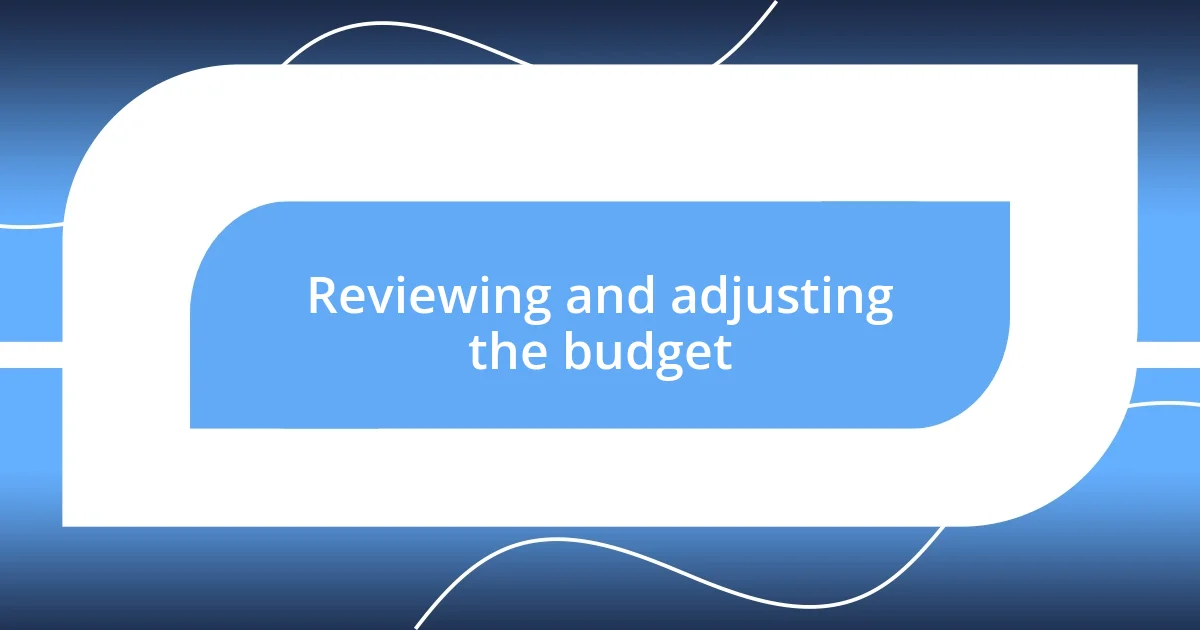
Reviewing and adjusting the budget
Reviewing my budget became a routine that I eagerly anticipated. Each month, I’d pour over my expenses, armed with a cup of coffee and a desire to understand my financial landscape better. I vividly remember one month when I discovered I had overestimated my grocery budget. It was a surprising realization—and, honestly, a bit of a relief, too! Reassessing that figure allowed me to shift funds to other areas like entertainment, which enhanced my quality of life. Do you notice patterns in your spending that surprise you?
Adjusting my budget is where the magic happens. I started viewing it not just as a rigid plan but as a dynamic tool that evolves with me. There was a period when I decided to pick up a new hobby—photography. It was essential for me to carve out some money for equipment while ensuring my essential expenses stayed covered. That little adjustment taught me that flexibility within my budget isn’t a failure; it’s a way to embrace change and growth. Have you ever thought of your budget as a living, breathing entity that reflects your current priorities?
The emotional connection to my budget became very clear when I hit a significant savings milestone. Celebrating these moments has been a game-changer; rather than just viewing numbers on a spreadsheet, I started to see how my adjustments led to tangible achievements. Each tiny tweak felt like adding a new brushstroke to a painting—in the end, it created a masterpiece of my financial journey. How do you celebrate your financial victories? Taking the time to recognize and adjust has made my budgeting experience much more rewarding.
